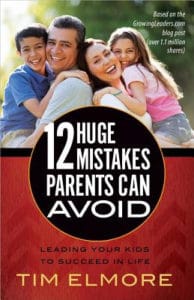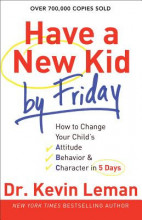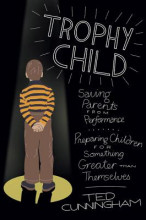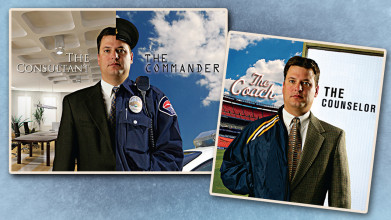Opening:
Teaser:
Dr. Tim Elmore: There have been—it’s a record that I know–two Easter egg hunts in past Aprils where the parents, well, they canceled the Easter egg hunt because the parents were knocking over children getting eggs for their own kids. (Laughter) Now I’m thinking, what in the world has happened? Well, I’ll tell what’s happened. We want so to help our kids get that advantage or that, you know, that break and I’m thinking but they’re not learning.
Jim Daly: Yeah.
Tim: They’re getting the breaks and then they expect a break from their boss at 25. And he’s not clapping for him when they go into work, you know, on time and there’s no trophy waiting for them. You know what I’m saying.
End of Teaser
John Fuller: That’s Dr. Tim Elmore, describing what we hope is an extreme example of a parenting mistake and we’ll see what you think on today’s “Focus on the Family” with Jim Daly. I’m John Fuller and there was some encouragement along the way and some challenging words, as well, from our guest last time, Jim.
Jim: There were, John and the time flew by so I–
John: It did.
Jim: –you can tell we were interested and engaged. (Laughter)
Jim: You look up and go, “Wow, that was a fast half hour” and that’s what happened last time.
John: I was learning lots, yeah.
Body:
Jim: If you missed it last time and you’re that desperate parent, kind of like John and myself, go get the download or order the CD. Get connected with the discussion last time and then listen today, because we’re gonna continue to talk about Tim Elmore’s book 12 Huge Mistakes Parents Can Avoid, and let me just say it this way. So often people will come to the end of the parenting journey, at least what they think is the end at 18, 19 and say I just wish I had a manual. I think this is the closest thing I’ve seen to that manual. What are, you know 12 big mistakes you don’t want to make and it informs you not to make the other 24. (Laughter) And so, Tim let me with that introduction say thank you for writing your book.
Tim: Absolutely. Well, guys, I admire you as not only godly men, but as men who are intentional about their parenting. I think most of the parents listening are, as I mentioned before, very intentional. They want to do the right thing, but sometimes I think we just fall into a trap. Either we’re exhausted by the end of the day–
John: Uh-hm.
Tim: –and you’re really saying. “You gonna tuck them in or am I gonna tuck them in? You gonna tuck them in, I tucked them in last night.” Or we just go overboard.
Actually when I meet with students–I’m in front of about 50,000 students and faculty a year–usually the mistakes fall into one of two extremes, abundance or abandonment. We did too much or we did too little. And I think that’s the fine line as a mentor parent we need to take. I did enough that you learned it. but I didn’t too much, do too much that you didn’t actually get it yourself; you just learned how to lean on me.
Jim: Tim, let me ask you that that continue diagram that we talked about—
Tim: Yeah.
Jim: –intrigues me, because again, I think as Christians we struggle with it because we’re trying to find this point on this continue where perfection is found–
Tim: Yeah.
Jim: –where we’ll meet Jesus.
Tim: Yeah. (Chuckling)
Jim: And really what you’re saying is just don’t get into the extremes.
Tim: Yes, yes.
Jim: Live in that middle ground much like Proverbs will talk about.
Tim: Yeah.
Jim: Live in that middle ground where it’s healthy.
Tim: Yeah.
Jim: Don’t lean too far this way or too far that way. Talk about that, though. To me it’s more of a zone more than it is a point on the continuum.
John: Hm.
Tim: It really is. It’s organic. In fact at the end of the book 12 Huge Mistakes, I actually give a list of things I think you ought to do and one of them is the whole idea of don’t think impose. Think expose.
In the early years of your child’s life, you need to impose a lot of rules and regulations. “Don’t touch the hot stove. That’s a rule!” But as they grow older, we’ve talked about this. You gotta move into the expose, meaning rather than just saying I’ve got a gazillion rules, I’m going to expose to some people you ought to meet, some opportunities you ought to experience.
But I tell you what, I’m not going to force it. With my son I remember saying, “Hey, I’m going to Chicago, You want to go with me?” He goes “No, I’ll just play video games. I’m fine”. And so, I thought you know what rather than say, “You’re going!” I left and I had a great trip. And when I got back over dinner, oh my gosh, the Chicago trip and I could tell he was getting a little jealous. I thought this is great.
Next time we had a trip he said, “Hey can I go?” And I thought, now exposing, now he’s going because he wants to be not because he has to be. That’s a huge difference as kids get older. It’s an attitude shift that we need to make.
Jim: And I think that’s good. We try to impose so much and I think is more typical. I mean it’s more typical of Jean and myself. I mean–
Tim: Yeah.
Jim: –I don’t know, John, are you in that?
John: We’ve been there.
Jim: You seem to be more mellow about it though, as I observe you and Dena.
John: Well, we’ve had longer to practice. I mean our oldest is in his mid-20s now and so, I think … I think I sort of feel like with Zane, he’s about 12, we have a redo and I can be a little more mellow, but you haven’t been in our home lately. (Laughter)
Jim: Well, maybe we should have dinner.
John: Maybe even just like last night I was imposing not exposing like I should have.
Jim: Well and again. It’s not one way or the other.
Tim: Right.
Jim: It’s not a flip of a light switch. It’s a dimmer switch and that’s where you got to find that middle ground.
Tim: Let me throw out a thought that may be so obvious to every listener it’s almost ridiculous, but our leadership style needs to change as they get older. I just thought that thought when you said your kids are growing up.
Tim: At early on it’s very much directive, but as they get to teens, if you’re still leading them like you were when they were 5, something’s wrong, so we’ve got to make that transition.
Jim: Yeah and Tim, it might be and I say this, correct me if you think I’m wrong, I’m wide open to that, but when you talk about that formula, parents need to be cautious of formulas, I think–
Tim: Yes, yes.
Jim: –because you can have different outcomes with two different children.
Tim: Yeah.
Jim: I see that with my boys. I need to parent them differently because they’re uniquely made–
Tim: Yes.
Jim: –in God’s image, but they have different expression—extroversion, introversion, more analytical, less analytical, more social, those kinds of things.
Tim: Yeah.
Jim: All those attributes bring a different parenting requirement, don’t they?
Tim: No doubt about it. In fact I think that means we need play chess not checkers in our home. You know when you play checkers, every piece is alike. You play chess you better know what each piece can do. It’s actually one of our “habit-tudes”–our images that form leadership habits and attitudes.
Jim: Habit-tudes, you gotta say that slowly.
Tim: Yes, habit-tudes.
Jim: What’s that, habit-tudes?
Tim: It’s actually a series that I started doing with my kids over dinner that we now are making available to schools, but every image represents a timeless principle and chess and checkers is one of the principles. I think parents can learn from it. When I play the game of chess, it’s harder, but I know the bishop. I know the rook. I know the king. I know the queen.
So in the 12 Mistakes book I talk about the research behind, there’s three kinds of kids in our home or combinations thereof–drivers, diplomats and dreamers. And depending on the makeup, we’re gonna have to lead them slightly differently. The driver child, that stubborn strong willed, they’re gonna take over the world one day and be either Mother Theresa or Adolf Hitler, one of the two, you know. (Laughter) So we need to be very clear and very direct.
But if you’re that direct with a diplomat, they’re gonna be in tears in five minutes ’cause, “You don’t love me; you don’t love me!” So with a diplomat you seek cooperation, ’cause they want harmony. And then with a dreamer child, they’ve got an imagination and a vision and they’re often misdiagnosed with ADHD too early sometimes.
Jim: They’re exhausting.
Tim: Yes, they are, but you know you know what I found? My son’s a dreamer child. If I want him to go clean up his room, I need to say, “Jonathan, you’re room needs to clean be cleaned up. Here’s five different options [sic] you can take.” So he gets to use his creative juices, but he still gets to the same goal. But it’s the leader that needs to change to get the follower where they need to go.
John: Hm.
Jim: Okay somebody is thinking how do you come up with five ways to clean your room? (Laughter)
Tim: Well yeah, yeah. Well that took the chess in me, the chess player in me to say, “Okay, it could be doing it [this way].”
Jim: I know there’s only one way to clean and that’s to get in there and clean it. (Laughter)
Tim: Do it now!
Jim: I just had that discussion this weekend, so that’s funny.
Tim: Well, can I tell you something funny? The first time I learned this lesson with Jonathan it was so funny ’cause he’s such a dreamer child. I said, “Jonathan, I need you to clean up your room.” I went in 30 minutes later. Not only was the room not cleaned up, there were four new construction sites going up in the room and, “Dad, I had an idea,” you know.
Jim: Now, one of my boys I would describe not one of those three, but what I would call “the literalist.”
Tim: Okay, oh yes.
Jim: So if we say to one of these children of our, one of these lovely boys–
Tim: Yeah.
Jim: –that God has given us, “Get in there. Make sure all your clothes are off the floor.” they will literally go in there, pick them up, and put them in a different place off the floor.
Tim: On the bed, yeah. Yeah.
Jim: And they actually are genuine in thinking they have met the requirement.
Tim: Yeah.
Jim: I call them the literalist.
Tim: That’s so true.
Jim: One day I remember this child, I said to him, “Mom is missing some chocolates off of her plates for the ladies tea this afternoon. Have you eaten all the chocolate?” And he said, “No, I haven’t eaten all the chocolate.” (Laughter) And then like 10 minutes later, I’m going okay the other one didn’t eat it.
Tim: Yeah.
Jim: Mom didn’t eat it. I didn’t eat it. So I go back to the same child and say “Did you eat some of the chocolate?” “Oh yeah. (Laughter) I ate some of the chocolate.”
Tim: But you never asked me that.
Jim: But I mean he goes, “But dad, you didn’t ask me that. You asked me if I ate all the chocolate.” I mean that’s crazy.
Tim: Yeah, no but it’s so true.
Jim: This kid’s gonna be an attorney.
Tim: Yeah, that’s right.
John: And it’s cute when they’re younger, but when it’s about 15, 16, 17?
Tim: It’s annoying. (Laughter)
Jim: It’s so true, but let’s talk. Last time I said I wanted to bring the hammer down on me with consistency, ’cause I travel a lot and this is an area Jean will applaud me for confessing.
Tim: Yeah.
Jim: You know I can be the guy that I lay that the boom and then I’m saying a day later, “Okay well, have you learned your lesson?” “Oh, of course dad, I learned it. Now can I have it back?” And I’ll go, “Oh yeah, okay, let’s go for it.”
Tim: Yeah.
Jim: It really irritates my wife. (Laughter)
Tim: Yeah, yeah.
Jim: Talk about that situation, what I need to be careful of?
Tim: Well, being inconsistent is one of the 12 mistakes I list in the book. I think the problem is and let’s just all just admit we’re all guilty of this. We’re human and so we’re not going to be perfectly consistent. But the more signals we send of inconsistency, it breeds insecurity in a child. And I’m not suggesting that’s happening in your home, but if we’re doing this too often—inconsistent, inconsistent–I’m getting mixed signals as a child and I’m getting really unstable and insecure, ’cause I don’t know are you hard on me? I actually tell parents this all the time.
I don’t think it really matters a lot whether you’re overly strict or under. Just be consistent. Just be the same so I know what the boss says is what she means. And you know what I’ll tell you where this shows up. You know, we start yelling, “Okay, you come in here right.” There not in. “Okay, in 30 seconds.” “Okay, in 45.” You know, and now they’re goin’, “You don’t mean a thing you’re saying.” And then finally we start yelling and now they get the message. Well, we’re conditioning them to go after the third time, I’ll come in and that’s not gonna help right now.
Jim: How about the parent that makes those declarations that are booming?
Tim: Yes.
Jim: You know you’ve planned a trip to Disneyland and you’re two weeks away and you need some leverage. Something’s goin’ downhill here. So, you pull out of your arsenal, “Listen if you don’t do this then you are not going to Disneyland.”
Tim: Yeah, yeah.
Jim: And then you walk out the room and your spouse says, “You know that’s not true.” (Laughter)
Tim: Yeah, yeah.
Jim: “I know but I need to motivate.”
Tim: Yeah, that’s right, yeah.
Jim: And of course, then you’re in trouble if child says I’m really not going to do it or they just choose not to do it. Now you got a problem ’cause are you gonna go to Disneyland?
Tim: Yeah, well, I’m not a fan of that and I’m not saying it’s always wrong. Sometimes it’s leverage, but here’s the problem. It’s what you just said. If I am not willing to follow through on every single condition or threat that I have made, they’ve figured it out, if not at 5, at 15. And so, now they’re gonna play this game and often play a parent against another and I just think that hinders the whole process.
So, last Christmas I remember hearing about a family that said we’re gonna cancel Christmas. I don’t know if you read this. And what they meant was not cancel the celebration of the birth of Christ. They still celebrated that, but they said no presents. And it was because the behavior thing. The boys weren’t doing what they wanted and when I read what they’d done, I thought, that’s very appropriate huge threat.
Tim: Well, the boys didn’t come through. They were interviewed later and the parents said, “We knew we had to follow through and be consistent.” The media covered this and the boys actually said, “Yeah, I probably should have done that. I realized and what we decided to do was give the presents away to kids that really needed them. And I tell you what, we’re gonna have Christmas next year. I’m going to make sure and get this right.” And I thought, thank God is actually worked in this situation, where the boys learned the lesson and the parents actually followed through–.
John: Uh-hm.
Tim: –on the threat
Jim: And it made a memory for the boys.
Tim: It did. I think the mom said, “It was probably our best Christmas celebration we ever had”–
Jim: H.
Tim: –’cause none of them needed the toys. None of them needed any and they were gonna get them from Grandma anyway or at birthday in February, you know, that’s sort of thing, so.
Jim: Tim, let me ask you this. Another one that caught me was we give kids what they should earn. Talk about that; we give kids what they should earn.
Tim: Yeah, this one must sound harsh and can I just reaffirm something? (Laughter) I love parents and I love children and I don’t think I’ve got this all figure out. However, too many cases like when I say too many, thousands of parents have, you know, given the iPhone, given the iPad or given this or given that as soon as the kid asks for it. We think to ourselves well, I’m not a good parent if I haven’t given it to them.
We look at our neighbors. Well, they’ve all given them everything they’ve ask for. So we have a new report card today and it’s give your kid whatever they want. I was just talking to parents in the suburb of Nashville, Tennessee, a very elite, private school. And in a Q and A session, a dad actually raised his hand and said, “So Dr. Elmore, you’re telling me I actually shouldn’t give my daughter everything she’s asking for, everything she wants.” And I thought, bingo, that’s exactly what I’d say, but what dawned on me, he didn’t know that. This didn’t dawn on him.
Jim: Yeah, it was an innocent question.
Tim: Yes, because the parents of today very often, not all the time, have a new report card. We’re not good parents unless we give them everything they want. So, let me give you real quick case study that I think is brilliant example of this.
I have a dear friend who had, who has a son named Nick and years ago, Nick had one of this new iPod. I think he was 12–years-old. Well, this iPod was this newest Apple release that was a special edition and Nick said. “Dad, if we don’t get this today, they’re gonna be all out.” Well, David said, my friend said, “Nick, how much money do you have?” “I don’t have any money, Dad, but we gotta get it today.”
Tim: So, David told me, he said, “Tim I was tempted to just buy it for him, ’cause I had the money. But he said, “I also knew that Nick would not learn what he needed to learn, that everything just doesn’t come automatically.” So here’s what David did. He bought the iPod and then he said, “Now Nick. I bought this iPod; I secured for our family and for you, later. But I’m gonna put it very high up in my closet and you’re gonna make monthly payments for the next 10 months until,” and they worked out a deal. And Nick kinda was wondering at first, ’cause lay-away had never occurred to him, you know, but what happened was beautiful. He said, “You never saw a kid make more, you know, prompt payments.”
Jim: Motivated.
Tim: Yeah, more motivated. So there was one ambition and motivation and David secured it, so he … we didn’t miss our chance and he said, he was so appreciative in ten months when I pulled that down and handed it to him, but I didn’t just give it him; he earned it.
John: Hm.
Jim: Now that’s an area that Jean and I, we’ve done well at (Chuckling).
Tim: Yeah, yeah.
Jim: Kids have basically bought all their big-ticket items—
Tim: Wow.
Jim: –outside of Christmas and it’s been good to see ’em motivated.
Tim: Yeah.
Jim: We haven’t done the lay-away; we just said—
Tim: Yeah, yeah.
Jim: –you can get that when you—
Tim: Yeah.
Jim: –can buy it.
Tim: Yeah.
Jim: We’re not buyin’ it for you.
Tim: Yeah.
Jim: But it’s made them very aware of saving—
Tim: Uh-hm.
Jim: –and I think the first thing that Trent bought was the Death Star, Lego Death Star. It was like $400, $500.
Tim: Yeah, that’s huge.
Jim: I mean, there’s no way I’m payin’ that and so, he saved money for about two years—
Tim: Wow.
Jim: –to buy that.
Tim: Wow, that’s gigantic. Two years—
Jim: Yeah.
Tim: –is a long time to wait.
Jim: It is.
Tim: Yeah.
John: And when we buy things, it seems like we’re just enabling them and—
Tim: Yeah.
John: –that’s not good preparation for life.
Tim: That’s right.
John: Well, we’re talking with Dr. Tim Elmore today on “Focus on the Family” and his book, 12 Huge Mistakes Parents Can Avoid and a CD or a download or the mobile app, so you can listen on the go, all available at www.focusonthefamily.com/radio or give us a call and we can tell you more, 800-A-FAMILY.
Jim: John, for those that might just be tuning in, I said at the top of the program that this is often said by parents who get to the end of the road and they say, “I just wish I could do it over again or I had a manual.” This is one of the closest things you’re gonna find to a good parenting manual, The 12 Huge Mistakes Parents Can Avoid. You know, this is what you want to read in order to avoid those traps and I think it will also, by inference, give you another 24 you don’t want to fall into. (Laughter) One of the ones, Tim, that caught me again, it was No. 6 in your list, “We Lie About Our Child’s Potential.” Ouch! I read that and I went, okay, this is getting’ raw. We often do. “You can be anything.” I have used those (Laughing) very words.
Tim: Yes, yes.
Jim: Of course, maybe not that baseball player—
Tim: Yeah, yeah.
Jim: –and you could’ve been the Rockies star.
Tim: Yeah.
Jim: But you’re right; we’re not real about limitations. How does that harm a child’s expectations?
Tim: Well, I think it harms very little when they’re extremely young, ’cause we need to affirm them. We want them to feel good about mama and daddy’s love, but I don’t think it works at 12. I know a Little League baseball player that gave the trophy back to his dad and said, “This doesn’t mean anything,” and it’s because it’s just been handed to him. Everybody got a trophy. Everybody got a ribbon.
Jim: Oh, so he reacted to that.
Tim: He reacted, so he was old enough, so these kids are not dumb. I’m just wondering if we are sometimes. (Laughter) So let me address this. Carol Dweck is a Stanford psychologist that I cite in the book and she began to see that we’re doing this far too often and she did a study on affirmation with children and she discovered that 85 percent of parents in America believe it’s very important to tell your child, “You’re smart.” And the reason we do is because we think, “Well, that’s gonna, you know, give ’em a little more confidence when they take the test on Friday.”
She had a sneaking suspicion it was gonna backfire and she proved herself right. They took two groups of 10-year-old children in the fifth grade and they gave them both a fifth-grade level test, an appropriate test. At the end of the test, the first group was told, “You must be smart.” The second group was told, “You must have really tried hard.” Notice it was about effort, not, “You’re awesome!”
Tim: When a second round of tests were given, it was a seventh-grade level test, a little bit tougher and they said, “This is harder. You don’t have to take it. Do you want to?” Almost none of the kids in the first group, that had just been told, “You’re smart,” wanted to take the test!
John: Hm.
Tim: It’s almost like, I’m gonna stop right here with, “I’m awesome,” you know and not gonna test it again and I have a sneaking suspicion that I’m normally not that smart.” Almost every kid in the second group actually wanted to take the test, the ones that had been affirmed for effort.
And Carol said, “Even though none of ’em did well, ’cause it was seventh-grade level test,” she said, “we continued to hear them whisper under their breath as they took the test, “This is my favorite test. I love this test.” They loved the challenge of it.”
When a final round of tests were given, a fifth-grade level test, the kids in the first group actually did 30 percent worse. And when they actually did the focus groups afterwards, Dr. Dweck said this, she said, “The kids were basically saying, ‘Well, if I’m so smart, I shouldn’t have to try so hard.’”
So, the affirmation backfired. When we weren’t truthful, we just said, “You’re awesome; you’re amazing; you’re gifted; you’re talented,” well, of course, we want ’em to feel that way, but we also need to be honest. “You’re not the next American Idol,” you know. And so, I think effort thing, rather than, “You’re just amazing” is far better to affirm.
Jim: Ah, you gotta be really careful with that—
Tim: Yeah.
Jim: –’cause you could limit a child that is a late bloomer.
Tim: That’s exactly right.
Jim: So, you gotta be so careful if they’re not achieving at 12, 13, 14. Look at Einstein. I mean, what an example. The child Einstein basically flunked out of school.
Tim: Absolutely.
Jim: I mean, if his mom and dad may have blown it right there.
Tim: You know, you’re spot on and so, I’m glad you said that. So, what Carol Dweck’s conclusions were, affirm variables that are in their control, late bloomer, early bloomer. So you say, “I love the strategy you used on that math problem.” “I loved how honest you were with your friends today.” “So, you’re affirming everything you can. In fact, be liberal with your affirmation, but make it truthful. And so, they’re continuing to know, “Well, effort’s in my control. Honesty’s in my control. I can keep doing that.” What gets rewarded gets repeated.” So, I think we just need to be careful to keep affirming and fan into flame that late bloomer that may show his gift at 30.
Jim: Right. Tim, we’ve talked a lot about the practical aspects of parenting, The 12 Huge Mistakes Parents—
Tim: Yeah.
Jim: —Can Avoid. I really need and want to bring the spiritual dimension into this program.
Tim: Yeah.
Jim: In addition to reading, writing, arithmetic, athletics, band, all the wonderful things and attributes that kids learn through those exercises, a lot of parents are worried about spiritual formation because the environment is so tough.
Tim: Yeah.
Jim: It’s like the world is against us as Christians. Public schools are not helpful like they once were in affirming these values.
Tim: Yeah.
Jim: What do we need to be aware of to help our child develop spiritually?
Tim: Good, it’s a great question. I hope I have a decent answer, Jim. At Growing Leaders, our organization, we make it our aim to continue to exegete this emerging generation so parents and teachers can understand who these digital kids [are], you know, who are on a touch screen now.
So, here’s some of our research. These kids are very experiential, so simply going to a Bible study may or may not work. You and I love Bible studies, but they may need a service project. Let’s get up and go and do something.
Jim: Right.
Tim: And maybe their walk with God’s not completely together yet, but boy, doin’ somethin’ in Mexico that’s helping to build an orphanage. I can use my hands wherever I am. But now my heart’s leaning in toward this, you know, this project. So, experiential; they’re very participatory, meaning they want to own what’s happening. Many of these kids have been weighing in on where the family goes on vacations since they were 5-years-old. They can hardly watch a reality TV show without voting on who stays on the show. So, we need to give them ownership. Our family’s different ’cause you’re in it and you’re gonna help get to guide where we go.
Their image rich. They grew up on, I call them “screenagers,” you know. (Laughter) They’ve just grown up with screens, so we need to have metaphors, not just didactic lectures and talks that we give to ’em, Lecture No. 43.
Tim: So, the “habitudes” I mentioned earlier, habitudes are images that form leadership habits and attitudes. Here’s an iceberg that talks to us about character. Here’s rivers [sic] and floods that talk to us about focus.
And then the last one I would give you, they’re connected. We know this. They’re connected socially, as well as technologically. We need to give them times with peers where they can connect with each other and think out loud. And yeah, they’ll come up with some bonehead ideas. We did, too, when we were growin’ up, but just the chance to connect and let the learning be owned because of the connection. It wasn’t just us downloading in a class or a home.
Jim: Tim, that is really good. The other aspect of the book and we’re running out of time and John, this time has flown by. You talk about the owl and the ostrich. I’ve found that very insightful as a parenting analogy. Explain what you were getting at.
Tim: Yeah, well, because we tend to want to be perfect parents and control everything, the two birds, the owl and the ostrich, I think are great metaphors. First of all, the ostrich typically has been, you know, the proverbial bird that sticks his head in the sand.
Jim: Yeah (Laughing)
Tim: And I don’t want to know; I don’t want to know; I don’t want to know.
Jim: It’s nobody’s national bird—
Tim: Yeah. (Laughing)
Jim: –let’s just put it that way. (Laughter)
Tim: I think you’re right about that. (Laughter) So, too often because we just don’t know what to do, we’re just throwin’ our hands up. We stick our heads in the sand and we don’t know what our kids are up to.
Jim: Hm.
Tim: On the other hand, the owl is this wise bird that can, 360 degrees, look all the way around, does its best work in darkness, not light and can see well. So, I think we need to be observing and we need to be up to date on what our kids … that doesn’t mean controlling; it just means, I’m understanding. Connection, not control is my aim, but I think that owl is just a great metaphor of I need to be watchful, do my best work at night and be lookin’ all around to see what’s really going on.
Jim: How about the tension can be in a home around discipline issues. You know—
Tim: Yeah.
Jim: –getting’ your homework done–
Tim: Yep, yep.
Jim: –cleaning up, you know, it’s been a fight forever.
Tim: Yeah.
Jim: So, how do you finally bury the hatchet and actually—
Tim: Yeah. (Laughing)
Jim: –hand it over to your 15-year-old and say, “It’s yours now.”
Tim: Yeah.
Jim: You’re not responding.
Tim: Here’s a thought and it’s worked in our home; maybe it’ll work in others. It’s a shift we need to make. Don’t think “rules,” think “equations.” Here’s the difference. We talked earlier about how we all have rules and we need rules, especially early on. But by the time they reach adolescence, no kid wants another rule. But equations, that’s what life’s made of. Equations are basically, if you dothat, this is the benefit. If you do this, that’s the consequence. And then when they choose a wrong thing about homework or whatever, you go, “Ah, you really made a bad equation there, didn’t you, Bob,” or Cal or Todd or Jessica or whatever.
And you’re able to say, you don’t have to rant and rave. You don’t even have to lift your voice and then they start realizing, life is full of equations and you would agree, wouldn’t you? Don’t pay your mortgage payment, bad equation, you know. Something comes down. So, I think parents need to be thinking, what are some equations we can talk through where we, up front say it and then they know it and then when they choose wrong, we say, “There’s a penalty for that equation and there’s a consequence to pay.”
Jim: Right, that is good advice. It really is. Tim, wonderful conversations these past couple of days. If you’ve missed any of it, come to the Focus website. Get—
John: Uh-hm.
Jim: –the download, get the CD, certainly get the book, 12 Huge Mistakes Parents Can Avoid written by Tim Elmore. Tim, it has been terrific to have you with us.
Tim: It’s been my pleasure. Thank you.
Closing:
John: And thanks, as well, Tim, for bein’ so candid about your own mistakes as a dad. I think it helps us to know that there’s nobody perfect out there, but we can become better parents. And you’ve given us a great place to start and of course, the book and the resources Jim mentioned can also help. We’ve got some details about all of those at www.focusonthefamily.com/radio. We can tell you more when you call 800, the letter A and the word FAMILY; 800-232-6459.
When you’re at the website, you’ll note that Peace in the Storm is something that we’re really emphasizing right now. A lot of families are struggling. We get that. A number of families here at Focus on the Family are dealing with difficulties, children who are really presenting some problems, the culture and all the encroachments on religious freedom and on truth, the assault on truth. But God’s truth is unwavering. It will never change and it will not fail. We’re committed to that foundation in the midst of life’s trials.
And we want to proclaim that with greater effectiveness. And so, we’re asking you to be a part of our financial support team. And so, we’re asking you to be a part of our financial support team. Help us this summer as we spread a message of hope and peace to hurting families, to parents who are uncertain. You can help us proclaim peace in the storm with your generous financial contribution of any amount today.
And thanks to some special friends, there’s a wonderful opportunity for you to effectively double your donation today. Your financial support can go twice as far in restoring marriages and encouraging parents and leading people into a life-changing relationship with Christ. Please contact us today and give as you can. Our number is 800, the letter A and the word FAMILY.
And when you help out with a gift of any amount, we’ll send a complimentary copy of Dr. Elmore’s book, 12 Huge Mistakes Parents Can Avoid. Donate and request that book at www.focusonthefamiy.com/radio.
Our program was provided by Focus on the Family and on behalf of Jim Daly and the entire team, I’m John Fuller, thanking you for listening, hoping you have a great weekend and inviting you back on Monday. We’ll hear from Elisa Morgan about how God can repair the broken places in your life, as we once again, help your family thrive.


















